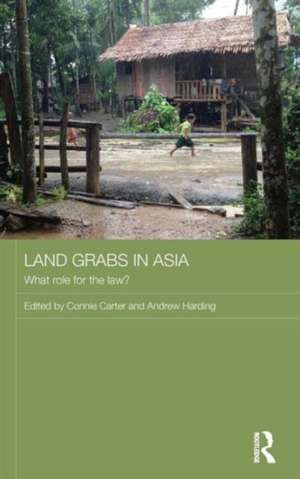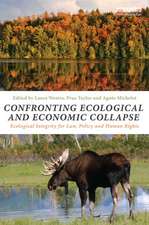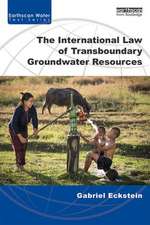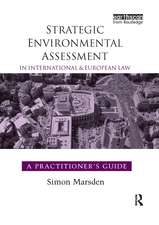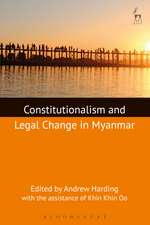Land Grabs in Asia: What Role for the Law?: Routledge Contemporary Asia Series
Editat de Connie Carter, Andrew Hardingen Limba Engleză Hardback – 14 mai 2015
This thought-provoking book defines land grabbing, and examines aspects of the land grabs phenomenon in seven Asian countries, researched and written by country-specific legal scholars. The book provides unique perspectives on how and why land grabbing is practised in China, India, Pakistan, Cambodia, Malaysia, Myanmar and Indonesia, and explores the surprising role that law plays in facilitating and legitimizing land grabs in each country. In contrast to most of the literature which law focuses on foreign investors’ rights under international law, here the focus is on domestic laws and legal infrastructures. Finding that Asian States need to move beyond existing regimes that govern land to a regime that encourages more equitable land rights allocation and protection of stakeholders’ rights, the book urges further research in the nexus between the use of law to facilitate development.
Land Grabs in Asia is the first book to explore land grabbing in multiple jurisdictions in Asia. As such, it will appeal to students and scholars of law and development, law and society, and international relations, as well as being essential reading for development policy-makers and government ministers.
| Toate formatele și edițiile | Preț | Express |
|---|---|---|
| Paperback (1) | 436.14 lei 6-8 săpt. | |
| Taylor & Francis – 30 iun 2017 | 436.14 lei 6-8 săpt. | |
| Hardback (1) | 1054.71 lei 6-8 săpt. | |
| Taylor & Francis – 14 mai 2015 | 1054.71 lei 6-8 săpt. |
Din seria Routledge Contemporary Asia Series
- 18%
 Preț: 702.95 lei
Preț: 702.95 lei -
 Preț: 351.56 lei
Preț: 351.56 lei -
 Preț: 325.78 lei
Preț: 325.78 lei - 9%
 Preț: 1003.33 lei
Preț: 1003.33 lei - 23%
 Preț: 327.54 lei
Preț: 327.54 lei - 18%
 Preț: 1057.89 lei
Preț: 1057.89 lei - 28%
 Preț: 821.29 lei
Preț: 821.29 lei -
 Preț: 412.57 lei
Preț: 412.57 lei -
 Preț: 396.14 lei
Preț: 396.14 lei - 18%
 Preț: 1064.70 lei
Preț: 1064.70 lei - 18%
 Preț: 1060.87 lei
Preț: 1060.87 lei - 18%
 Preț: 1057.40 lei
Preț: 1057.40 lei -
 Preț: 114.30 lei
Preț: 114.30 lei - 28%
 Preț: 825.06 lei
Preț: 825.06 lei - 49%
 Preț: 543.60 lei
Preț: 543.60 lei - 18%
 Preț: 1063.89 lei
Preț: 1063.89 lei -
 Preț: 248.10 lei
Preț: 248.10 lei - 28%
 Preț: 821.53 lei
Preț: 821.53 lei - 18%
 Preț: 704.83 lei
Preț: 704.83 lei - 18%
 Preț: 1061.84 lei
Preț: 1061.84 lei -
 Preț: 363.20 lei
Preț: 363.20 lei -
 Preț: 488.71 lei
Preț: 488.71 lei - 18%
 Preț: 1058.43 lei
Preț: 1058.43 lei - 18%
 Preț: 1055.06 lei
Preț: 1055.06 lei - 18%
 Preț: 1060.87 lei
Preț: 1060.87 lei - 18%
 Preț: 1064.01 lei
Preț: 1064.01 lei - 18%
 Preț: 1050.09 lei
Preț: 1050.09 lei - 18%
 Preț: 1061.06 lei
Preț: 1061.06 lei - 18%
 Preț: 706.78 lei
Preț: 706.78 lei - 18%
 Preț: 1055.51 lei
Preț: 1055.51 lei - 14%
 Preț: 298.61 lei
Preț: 298.61 lei -
 Preț: 364.94 lei
Preț: 364.94 lei - 18%
 Preț: 733.20 lei
Preț: 733.20 lei -
 Preț: 416.96 lei
Preț: 416.96 lei - 18%
 Preț: 1057.13 lei
Preț: 1057.13 lei - 18%
 Preț: 1057.05 lei
Preț: 1057.05 lei - 18%
 Preț: 1276.26 lei
Preț: 1276.26 lei - 18%
 Preț: 1057.05 lei
Preț: 1057.05 lei - 18%
 Preț: 1061.93 lei
Preț: 1061.93 lei - 18%
 Preț: 1109.99 lei
Preț: 1109.99 lei - 18%
 Preț: 732.06 lei
Preț: 732.06 lei -
 Preț: 398.18 lei
Preț: 398.18 lei
Preț: 1054.71 lei
Preț vechi: 1286.24 lei
-18% Nou
Puncte Express: 1582
Preț estimativ în valută:
201.81€ • 210.73$ • 166.65£
201.81€ • 210.73$ • 166.65£
Carte tipărită la comandă
Livrare economică 15-29 aprilie
Preluare comenzi: 021 569.72.76
Specificații
ISBN-13: 9781138904019
ISBN-10: 1138904015
Pagini: 212
Ilustrații: 1 black & white tables
Dimensiuni: 156 x 234 x 18 mm
Greutate: 0.45 kg
Ediția:1
Editura: Taylor & Francis
Colecția Routledge
Seria Routledge Contemporary Asia Series
Locul publicării:Oxford, United Kingdom
ISBN-10: 1138904015
Pagini: 212
Ilustrații: 1 black & white tables
Dimensiuni: 156 x 234 x 18 mm
Greutate: 0.45 kg
Ediția:1
Editura: Taylor & Francis
Colecția Routledge
Seria Routledge Contemporary Asia Series
Locul publicării:Oxford, United Kingdom
Public țintă
Postgraduate and UndergraduateCuprins
1. Consent not coercion: Rethinking the taking of land for ‘development’ 2. International law response to land grabbing in Asia 3. How land grabs are made ‘constitutional’ in China 4. Il-legality with Chinese characteristics: How administrative litigation addresses land grabs in China 5. The legal design of land grabs: Possession and the State in post-conflict Cambodia 6. Indonesia’s Land Acquisition Law: towards effective prevention of land grabbing? 7. Winners and losers: Land grabbing for foreign investment in the new Myanmar 8. Peninsular Malaysia’s ‘customary lands’: How does legal paternalism facilitate land grabs? 9. Land grabs in Sabah, Malaysia: Customary rights as legal entitlement for indigenous peoples: Real or illusory? 10. Perspectives on land grabbing in Vietnam 11. Transnational State responsibility for human rights violation resulting from global land grabs
Notă biografică
Connie Carter is Professor of Law & International Business in the Faculty of Management at Royal Roads University, Victoria, Canada. She is also a Barrister of Lincoln’s Inn, currently non-practising. Her research focuses on law and development, foreign direct investment and corporate social responsibility in China and South East Asia.
Andrew Harding is a Professor in the Faculty of Law, National University of Singapore, where he is also Director of the Centre for Asia Legal Studies and Director of the Asia Law Institute. He is a leading scholar in the fields of Asian legal studies and comparative constitutional law, on which has published widely.
Andrew Harding is a Professor in the Faculty of Law, National University of Singapore, where he is also Director of the Centre for Asia Legal Studies and Director of the Asia Law Institute. He is a leading scholar in the fields of Asian legal studies and comparative constitutional law, on which has published widely.
Descriere
This thought-provoking book defines land grabbing, and examines aspects of the land grabs phenomenon in seven Asian countries. It provides unique perspectives on how and why land grabbing is practised in China, India, Pakistan, Cambodia, Malaysia, Myanmar and Indonesia, and explores the surprising role that law plays in facilitating and legitimizing land grabs in each country. Finding that Asian States need to move beyond existing regimes that govern land to a regime that encourages more equitable land rights allocation and protection of stakeholders’ rights, the book urges further research in the nexus between the use of law to facilitate development.
This book was facilitated by grant No. R-241-000-116-112 (Ministry of Education, Singapore, and NUS Academic Research Fund).
This book was facilitated by grant No. R-241-000-116-112 (Ministry of Education, Singapore, and NUS Academic Research Fund).
